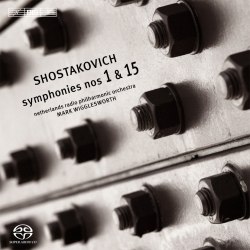| 
|
Dmitri SHOSTAKOVICH (1906-1975)
Symphony No. 1 in F minor,Op. 10 (1924-1925) [32:03]
Symphony No. 15 in A major, Op. 141 (1971) [46:16]
Netherlands Radio Philharmonic Orchestra/Mark Wigglesworth
rec. October 2006, Music Centre for Dutch Radio & Television, Studio MCO5, Hilversum, The Netherlands. Reviewed as 24-bit/44.1kHz download
BIS BIS-SACD-1643 [79:15]
‘Wigglesworth’s Shostakovich cycle is the finest - and
most consistently satisfying - in the catalogue.’ That was my
response to the previous instalment in this series, which included
the No. 1 reissued here (review).
BIS have now covered all these symphonies, a project that began with
the Leningrad in 1997. Even then - with the BBC National Orchestra
of Wales - it was clear we were in for something rather special; that
said, Wigglesworth’s more recent performances with the Netherlands
Radio Philharmonic are in another league entirely. I’ve reviewed
most of the latter, and their artistic strengths are matched by recordings
of considerable range and splendour.
Over the years I’ve heard many accounts of these symphonies,
all of different vintage and some of doubtful provenance. The one
constant is the quality of the music itself; even the Cinderella pieces
- Nos. 2, 3, 7 and 12 - respond gratefully to a thoughtful approach.
Indeed, Wigglesworth’s quiet, cerebral progress is part of what
makes his performances such a revelation. Happily that never seems
to result in a lack of tension or drama; paradoxically, such a cool,
analytical method allows the music to ‘speak’ plainly,
without added histrionics or blatant manipulation. That’s no
bad thing in scores that, for the most part, are already so volatile.
In that sense Wigglesworth’s Shostakovich is a palate cleanser,
a necessary corrective to all that’s gone before. That’s
not to say the insights of Kondrashin et al are any less
valuable when it comes to understanding this complex, conflicted composer;
if anything they all contribute to a multi-faceted, always fascinating
portrait of a truly formidable talent. That prodigious gift is evident
in the First Symphony, which some detractors suggest contains less
of Shostakovich than first thought. Surely there’s too much
of what we hear later - the mordant wit, the distinctive sonorities
and those familiar progressions - for it to be anything other than
an original, focused and very personal piece.
As I reviewed this version of No. 1 when it was coupled with Nos. 2 and 3 all I will say here is that revisiting it after a longish break has increased my admiration for both the work and Wigglesworth’s performance. No. 15, the culminating work in this most valuable cycle, was recorded at the same time as the First; collectors may well be irritated by the duplication, which could have been avoided with a new recording of, say, The Execution of Stepan Razin. I’d really like to hear more Shostakovich from this team, but I have a feeling that’s all we’re going to get.
Given what we’ve already received it seems churlish to complain.
We must also be grateful for the number of fine Fifteenths in the
catalogue. Haitink (Decca) has long been a favourite of mine, not
least for his judicious blend of wit and introspection. Kondrashin’s
Melodiya account is uniquely Russian - sometimes raw, always illuminating
- as is Maxim Shostakovich’s recording of the 1972 premiere
(on a Melodiya LP). Of more recent versions Dmitri Kitaienko (Capriccio)
offers both a forensic examination of the score and top-notch engineering
(review).
That said, the one I turn to most is Kurt Sanderling’s with
the Berliner Philharmoniker; first issued on the orchestra’s
own label, this performance digs deeper and goes darker than any I
know. Kondrashin’s 1974 Dresden account (Profil) isn’t
far behind.
So, how does Wigglesworth's Fifteenth fare in such august company?
It takes a while to warm up - the first movement seems a little po-faced
at the outset - but the mood does lighten thereafter. As always there’s
nothing rushed about Wigglesworth’s reading, with every tic
and nuance laid bare in the most natural and unaffected way. By contrast
Haitink has more point and sparkle, and Decca’s sharpened edges
add to the music’s brittle humour. Wigglesworth’s insistence
on more air around the notes really pays dividends in the strange,
disembodied second movement; the muted brass are unanimous, the twisting
cello line is as wistful as any, and it’s all so thrillingly
spectral.
The Allegretto is well shaped and sprung; the playing is wonderfully
alert and precise, and the music’s quirks and quiddities are
never overplayed. I wouldn’t have minded a bolder, more vivid
sound - one has to crank up the volume for it all to snap into focus
- but then this isn’t the mighty Eighth or Eleventh. Indeed,
I’ve seldom heard this finale sound so quietly refined. Some
listeners may prefer the upfront presentation of, say, Haitink, but
Wigglesworth’s restraint and attention to detail are just as
compelling. Moreover he builds climaxes from afar, so that when they
arrive they do so with devastating impact.
It’s hard to believe that these performances are sourced from
44.1kHz originals, such is their presence and timbral accuracy; just
sample the drum taps and soft tam-tam strokes in the finale, for instance.
More important, there’s a sense of time suspended, of an audience
holding its collective breath, and that’s very rare in a studio
recording. At the heart of it all is Wigglesworth’s masterly
control of structure and dynamics; the end result is discreet, direct
and utterly absorbing.
Well worth the wait; a fitting end to this fine cycle.
Dan Morgan
http://twitter.com/mahlerei
Masterwork Index: Shostakovich symphony 1 ~~ Symphony 15
 |
 |
|











